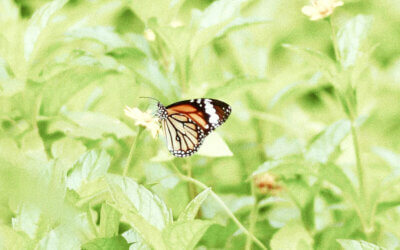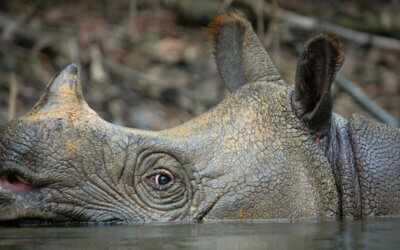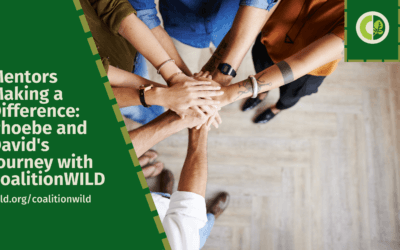CONSERVATION CONFIDENTIAL: An Insider Look at the People, Politics, and Predicaments in the Campaign for IUCN Motion 101 and the Effort to Protect Half of Earth’s Land and Seas
On this series, documents in real-time the challenges and opportunities confronted by a team of conservation policy experts and communicators in the lead up to the 26th World Conservation Congress and the historic global public debate dedicated specifically to protecting Half of Earth’s land and seas.
Here in the Colorado foothills, the refreshing rush of clear, early summer mountain streams belie mischievous and primal torrents below. Locals warn the uninitiated against entering these rivers with anything they are afraid to lose for the current will rob you of sunglass, sandal, and watch as easily as an expert thief swipes a wallet. That is why when I go to the river, I take little more with me than my inner tube and my life.
Not all currents are material currents, and mountain rivers aren’t the only deceptively powerful tides I navigate. This September, in Marseilles, France, national delegations will convene at the 26th World Conservation Congress organized by the International Union for the Conservation of Nature (IUCN). They will meet, in part, to offer a formal, global answer to the question, “How much nature do people need to survive?”
I say “formal, global answer” because science already has an answer to this question, that being Half. We need at least Half of Earth’s land and seas relatively wild and intact – and in some places, such as rainforests, substantially more – in order to have any hopes of stabilizing the climate emergency, halting mass extinction, and securing the livelihoods, most immediately, of 1.6 billion people. This measure – protecting Half – is as necessary as becoming net carbon neutral and keeping temperature rise under 1.5 Degrees Celsius. However, unlike carbon neutrality, protecting Half does not need to be achieved in every country, but instead represents a global total with emphasis on landscapes with planetary importance.
When the World Conservation Congress convenes on September 3-11, 2021, I will join them as one of the delegates voting on the issue of nature as it pertains to our own survival. To this momentous current, I will not bring my inner tube, but like all in attendance I will carry with me my life, and a great many more. Our answer to this question will ultimately reverberate in the lives of our loved ones, our children, the multitude who were not invited and cannot attend, and those who are not yet born.
Why I believe we need to protect Half, sooner rather than later, is clearly stated here and is a belief I share with more than 70% of conservation scientists around the world. It is something I learned from both contemporary and traditional scientists as well as Indigenous Elders.
It is an idea that has existed for decades and one that falls to us, this generation, to manifest now. After all, our accelerating ability to destroy the Earth comes with the necessary responsibility of protecting it.
My purpose with this blog series isn’t to advocate for Half – there will be enough of that in the weeks to come. If you would like to help me with that effort (and I hope you do because while I am not alone in this campaign, we still need millions more to join us if we are to maximize our planet’s chances of success), you can learn more about how to become a Survival Revolution/Nature Needs Half Ambassador here. Rather, in this blog series I would like to share with you the inside scoop on how decisions of global significance are made – the drama, suspense, discoveries, and ultimately, camaraderie of an ambitious team of conservationists. A team who in the words of one skeptic got “too big for their britches” when they took on the responsibility of changing the world with a strategy fueled far more by urgency and conviction than by pragmatism and budgets.
Much like Rocky Mountain rivers in June, the first couple of weeks of September in Marseilles will be torrential. Even though the world is a far different place than it was only a decade ago, when it was nearly impossible to publicly discuss protecting Half of Earth’s land and seas (even if it was quietly discussed behind closed doors), the tides of opposition, apathy, and cynicism swell around us even still. The science is as clear as a mountain stream – the politics are anything but. And to this current, as to all currents, I can’t help but carry with me a few things I am afraid to lose, not the least of which is our future.
I ask you to tune into this series if you are interested in the outcome of and lead up to this decision. On a personal level, I ask you to tune in so that you can help me, help us, carry some of the weight of what is at stake, not to lessen our responsibility to do what is right, but to ensure that if things do go sideways there are others ready to head downstream, recover what we can, and try again – better, more informed – at the soonest opportunity.
I look forward to introducing you to the audacious and dogged personalities that bring their significant talents and expertise to making this year a turning point for nature. It is these individuals who will bring to life what is too often depicted as a lifeless and perfunctory process: global policy. While not every moment makes for page-turning excitement, the overarching story of the 26th World Conservation Congress is, for now, a cliffhanger with nothing short of the future of life on Earth in the balance.
I invite you to join me on this journey, and hope that when all is said and done, together we will share in nature’s victory.
READ NEXT
A Reflection by Timothy Hass, WILD’s Trustee
I know that for many people, venturing into wilderness areas is a very important element for health and balance in their lives. I feel this as well, but also, for me, the nature directly around me is equally important.
Tech & Tradition – Q&A with Ruari Bradburn, Chief Technology Officer at Langland Conservation
“Tech & Tradition” delves into the evolving landscape of conservation, exploring the synergy between traditional wisdom and technological innovation.
Mentors Making a Difference: Phoebe and David’s Journey with CoalitionWILD
At CoalitionWILD, we believe in the power of mentorship and the transformative impact it can have on the lives of young conservationists. Here, we shine a spotlight on two exceptional repeat mentors, Phoebe Barnard and David Manski, who have been actively involved in our Global Mentorship Program. Their dedication, wisdom, and passion for conservation have inspired and guided numerous young professionals on their journey to become future leaders in the field.


